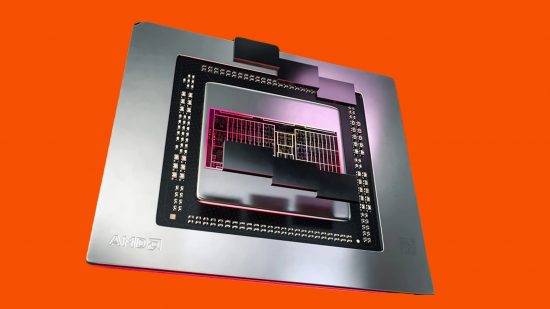We have some disappointing news for anyone hoping to see new and improved integrated graphics from AMD. It appears as though the company is setting itself up to stay committed to RDNA 3+, a refresh of its existing RDNA 3 GPU architecture, until at least 2027.
While its Ryzen processors are rightly regarded as some of the best gaming CPUs on the market, AMD enjoys similar success when it comes to the performance of its integrated graphics. The company’s APUs power many of the best handheld gaming PCs, while also making a splash on the desktop with its 8700G, which is capable of 63fps in Cyberpunk 2077 without the need for a discrete graphics card.
The latest CPUs from AMD, in the Ryzen 7000 and 8000 series, feature RDNA 3 integrated graphics. Upcoming chips, however, will upgrade to a refreshed architecture, known as ‘RDNA 3+’, which should naturally give more performance. Frustratingly, though, it’s set to power AMD APUs “until at least 2027” according to leaker Golden Pig Upgrade.
Long-time followers of AMD will find this proposed period of iGPU stagnation somewhat familiar. Its Vega architecture was used in APUs as new as the Ryzen 5000 series, despite the newer, more powerful, RDNA 2 architecture being readily available.
Coincidentally, RDNA 4 is expected to arrive later this year, powering Radeon RX 8000 series graphics cards. Meanwhile, an RDNA 5 GPU is already catching the attention of Microsoft for a next-generation Xbox console. This makes AMD’s decision to stick with RDNA 3+ for the foreseeable future all the more puzzling, seeing as the company and partners clearly have faith in its newer architectures.
Previously, Zen 6 CPUs were expected to ditch RDNA 4 in favor of RDNA 5 integrated graphics. In the wake of this new information, though, it could mean the future Ryzen processors will sport RDNA 3+ instead. As such, there would be no meaningful leap in graphical architecture on the company’s iGPUs until the eventual release of Zen 7.
Time will tell if this is the case, but the AMD track record suggests it shouldn’t be a surprise if so. In the meantime, if you’re looking to create your very own custom PC, we can show you how to build a gaming PC with our step-by-step guide.
